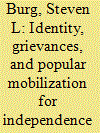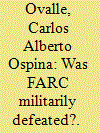|
|
|
Sort Order |
|
|
|
Items / Page
|
|
|
|
|
|
|
| Srl | Item |
| 1 |
ID:
108028


|
|
|
| 2 |
ID:
140734


|
|
|
|
|
| Summary/Abstract |
Ted Robert Gurr explains group mobilization in terms of the joint effects of shared identity, economic and status grievances, and the actions of political entrepreneurs. This article examines the relative effects of identity, material grievances, and estimates of the consequences of independence on two key indicators of support for independence in Catalonia: declared preferences for independence and intentions to vote for independence in a future referendum. We examine the impact of political entrepreneurs by analyzing the vote for independence-oriented parties in the 2012 Catalan election. Our findings suggest mobilization is more a product of strong Catalan identity than of grievance, and that mitigation of Catalan demands will therefore require increasing the recognition and status of Catalonia in the Spanish state.
|
|
|
|
|
|
|
|
|
|
|
|
|
|
|
|
| 3 |
ID:
142734


|
|
|
|
|
| Summary/Abstract |
I propose the concept of “ignoring” to capture situations in which government officials appear dismissive (either through inaction or contempt) of popular mobilization. The concept refers not only to actions by regime officials but also captures protesters' perceptions of those actions. Examples of ignoring include not communicating with protesters, issuing condescending statements, physically evading protesters, or acting with contempt toward popular mobilization. Existing conceptual tools do not adequately capture these dynamics. Although repression and concessions have been extensively theorized, scholars lack conceptual tools to understand responses that fall short of both repression and concessions. I introduce the concept of “ignoring” as a useful tool to focus on a subset of actions on the part of regime officials who are the targets of mobilization, with discernible consequences for subsequent mobilization. Drawing on research on the role of emotions in protest politics and on framing and social movements, I argue that ignoring protests can trigger emotional responses that encourage people to engage in protest, such as anger, indignation, and outrage. By integrating protesters' perceptions of the behavior of the targets of mobilization, not just of the security forces, the concept of “ignoring” helps explain protesters' reactions and their future mobilization, in a way that conventional concepts such as tolerance cannot capture. This analysis has important implications for broader theoretical debates on the relationship between regime response to protests and subsequent mobilization. Most importantly, it urges scholars to consider how ignoring can interact with other responses to mobilization, thereby altering the dynamics of the infamous the “concession-repression dilemma.” I use evidence from workers' protests in late Mubarak Egypt to illustrate these dynamics.
|
|
|
|
|
|
|
|
|
|
|
|
|
|
|
|
| 4 |
ID:
169253


|
|
|
|
|
| Summary/Abstract |
Whereas in other MENA countries the impact of neo-liberal policies has been the subject of intense debate, there are at present few voices that directly analyze or critique its social and political consequences in Iran. This article seeks to address this lacuna by analyzing the dynamics of reformism, economic liberalization and popular mobilization in Iran. It charts the country’s move from a post-revolutionary populism to a liberalized yet increasingly exclusivist model of politics and compares this to trajectories of economic liberalization in Egypt. Two distinct outcomes of economic reform are analyzed in the first part of the article: Socioeconomic exclusion; and the contraction of political rights. In the second half, I investigate the ways successive postwar governments in Iran have packaged neoliberal reforms, and how their reimagining of the role of the state has led to differing levels of popular resistance. Finally I argue that under the present administration, political elites increasingly are oriented toward strengthening the state and seeking to limit opposition to their policies. However, the absence of neoliberal hegemony in Iran means that growing mobilization on socioeconomic issues is challenging these policies. The Right in Iranian politics is utilizing this mobilization to present a populist challenge to the reformists in power.
|
|
|
|
|
|
|
|
|
|
|
|
|
|
|
|
| 5 |
ID:
120986


|
|
|
|
|
| Publication |
2013.
|
| Summary/Abstract |
This article examines political discourses in "patriotic" zouglou songs during the Ivorian crisis from 2002 to 2007, and reveals far-reaching and interwoven changes in the conduct of politics in post-Houphouët-Boigny Côte d'Ivoire: a more populist style of politics, a resurgent nationalism, and a newly engaged public sphere. Documenting the infrastructural arrangements that made "patriotic" recordings and performances possible through the activities of political entrepreneurs in the Ivorian music business, the article reveals the struggle of musicians to retain control of their art form. It argues that a new generation of political actors used popular music as a tool of popular mobilization, and that the idioms of "praise" and "protest" do not capture the complex ways in which musicians positioned themselves in relation to politics. Instead, zouglou music became a contested space where politicians from both camps tried to co-opt musicians. The article thus contributes conceptually to the study of popular music and political discourse in Africa, and empirically to our understanding of recent Ivorian political history.
|
|
|
|
|
|
|
|
|
|
|
|
|
|
|
|
| 6 |
ID:
152962


|
|
|
|
|
| Summary/Abstract |
The concept of military victory has become opaque and quite different from the days of the industrial wars. Full military victory through total annihilation of the enemy has yielded to more complex ways of achieving political objectives. Eventually the understanding of the fact that the war is unwinnable on martial terms shifts insurgent strategy to one of survival, normally peace talks. It is this very shift of strategy, albeit the absence of insurgent annihilation, that constitutes the core of military victory for the government. Politicians and decision makers, if not military forces, blinded by the victory idea of the past, are unable to understand this reality. Hence, when peace talks are held, they are approached as the end of conflict rather than a shift to war by other means. This gives the upper hand to the insurgents.
|
|
|
|
|
|
|
|
|
|
|
|
|
|
|
|
|
|
|
|
|